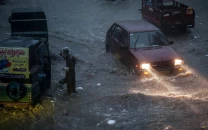Karachi’s future development hangs in balance, say panellists
Karachi lacks ownership, says Farooq Sattar
The 7th Annual Karachi Conference. PHOTO: EXPRESS
A myriad of issues prevailing over Karachi has, to an extent, affected the development process and marred a potential yet to be fully explored. And as if the existing problems weren't enough, the recent monsoon season wreaked havoc on Karachi.
The 7th Annual Karachi Conference on Saturday discussed Karachi's future development in the wake of these recent challenges, emphasising the effects of the recent rains on the sewerage, drainage, power and transport system.
Speaking on the occasion, former Muttahida Qaumi Movement-Pakistan (MQM-P) leader Farooq Sattar said that criminal negligence on the part of provincial, federal and local governments is responsible for Karachi's deplorable state in the aftermath of unprecedented rains. "It's a collective failure of all the authorities concerned. Karachi, the biggest cosmopolitan city, lacks ownership. There is a dire need to make improvements on structural and organisational levels," said Sattar.
MQM-P pushes for Karachi uplift package
"The provincial government should establish local bodies and empower them since Karachi's infrastructure issues fall under the latter's domain," he highlighted.
The former MNA also presented his constitutional and administrative solutions to issues hampering the metropolis's growth.
"The next mayor would need between 25 and 30 years to understand the dynamics of Karachi. I would emphasise the implementation of Article 140-A, which can be the saviour of the city and salvage issues without deepening the urban-rural divide," added Sattar. The conference also saw representatives from K-Electric (KE) highlight the concept of 'urban resilience' and challenges concerned with the city's electric supply.
"Karachi's population is growing rapidly and so is the pressure on resources and the overall infrastructure," said KE Chief Distribution Officer Amer Zia.
"Due to urban planning challenges, people are facing difficulties. We couldn't supply electricity to inundated areas of Ibrahim Haideri during the rains for safety concerns."
K-Electric officials stressed that urbanisation in other countries increased the overall productivity of cities. In Karachi, on the other hand, people could not avail the benefits. They underscored that the power infrastructure has been encroached, creating a dangerous and unsafe system.
'Sindh govt spending billions on Karachi’s development’
Leader of the opposition in the Sindh Assembly Firdous Shamim elaborated on the K4 project and the city's water issues.
"Karachi's population is increasing at a rate of 4.2%, according to the census," he said. "There is still a shortage of water in the city. Further, around 30% of Karachi’s water is wasted due to line losses. These facts should also be considered when talking about planning," he said.



















COMMENTS
Comments are moderated and generally will be posted if they are on-topic and not abusive.
For more information, please see our Comments FAQ